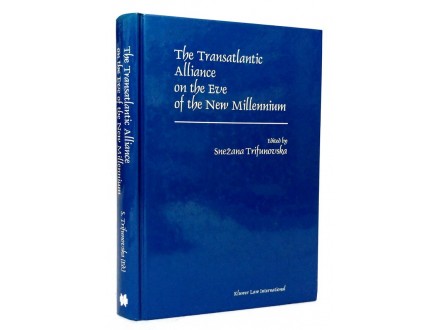The Transatlantic Alliance on the Eve of the New Millen
| Cena: |
| Želi ovaj predmet: | 1 |
| Stanje: | Nekorišćen |
| Garancija: | Ne |
| Isporuka: | Pošta Lično preuzimanje |
| Plaćanje: | Tekući račun (pre slanja) Lično |
| Grad: |
Beograd-Mladenovac, Beograd-Mladenovac |
ISBN: Ostalo
Godina izdanja: 1996
Jezik: Engleski
Autor: Strani
The Transatlantic Alliance on the Eve of the New Millennium
by Snezana Trifunovska
Kluwer Law International 1996 338 strana
Introductory Part.
The Origin and Objectives of the Berlin Seminars; A. Triestram.
The Transatlantic Alliance and the Changing European Security Environment; S. Trifunovska.
Part One: Position of NATO in the New Security Environment. Must NATO Fail? Theories, Myths and Policy Dilemmas; D. G. Haglund.
NATO and the New World Order: Anarchy? H. Tromp.
The NATO Enlargement: Implications and Perspectives for Transatlantic Relations; V. I. Krivokhizha.
NATO – PFP – Russia: A Triangle of Changes and Challenges; S. K. Oznobistchev.
France and NATO; P. Boniface.
Part Two: Transatlantic Relationship and the Issues of Isolationism, Renationalisation and Denationalisation. The Second Coming of `America First`: Neo-Isolationism and the Return to `Fortress America`; R. F. Farnen.
European Security With or Without America? ? J. D. McCausland.
Renationalisation and Denationalisation in Europe: Implications for Transatlantic Security; D. T. Stuart.
Renationalisation of Western Defence and Security Policies: A German View on a Hesitant Spectre; R. Wolf.
The Czech Views on Some Issues of Renationalisation; S. Stach.
Isolationism from the Turkish Point of View; E. Gü rsoy-Naskali.
Nationalisation or Multilateralisation of the European Armed Forces – A Brief Comment on the Danish View; K. P. Pedersen.
Part Three: European Security and Defence Identity. The Making of a European Foreign and Defence Identity: Neo-Realist and Constructivist Perspectives; G. Hellmann.
The North Atlantic Alliance Politics in a European Context: Problems, Prospects and the Question of a European Political Union; P. Ifestos.
European Security and Defence Identity: Myth or Reality? I. Johansen.
A Spanish Perspective on the European Security; E. S. Mateos.
Germany`s Security Policy and the Role of Bundeswehr in the Post-Cold War Period; K. Freytag.
Appendix I: Selected Documents.
Appendix II: Selected Bibliography.
Index.
Within these pages is a veritable banquet for those who savour the politics of international security. The reader is offered factual analysis, insight, new perspectives, revisited concepts, problem spotting and recipes for solutions. Academic observers from a dozen different countries in Eastern and Western Europe and on both sides of the Atlantic subject a large number of questions of topical interest in the security field to one or other of these forms of treatment. Their debate embraces reinforcement of the European pillar of the Alliance; adjustment of the balance of responsibilities between the two sides of the Atlantic; and shoring up the transatlantic partnership and perhaps broadening it into that elusive concept, a `transatlantic community`, stretching into economic and other fields. They address the perceived security vacuum in parts of Central and Eastern Europe and discuss measures to build up greater confidence between former Cold War antagonists and ways of developing in them the habits of co-operation rather than counter-operation. They draw up architectural designs for the security of the twenty-first century and grapple with the conflict of ideas circulating about the Alliance`s future and particularly about its future relationship with Russia. Isolationism, nationalism, multilateralism, realism, constructivism and other -isms are helpfully put into context. Renationalisation, denationalisation and identities in formation or in decline are also investigated.
Ne šaljem u inostranstvo!
Ne šaljem na Kosovo (tj. Pošta ne prima pošiljke za Kosovo).
Predmet: 77110837







